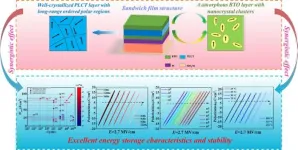(Press-News.org) NEW YORK, NY — Black-capped chickadees have extraordinary memories that can recall the locations of thousands of morsels of food to help them survive the winter. Now scientists at Columbia's Zuckerman Institute have discovered how the chickadees can remember so many details: they memorize each food location using brain cell activity akin to a barcode. These new findings may shed light on how the brain creates memories for the events that make up our lives.
"We see the world through our memories of objects, places and people," said Dmitriy Aronov, PhD, a principal investigator at Columbia’s Zuckerman Institute and an assistant professor of neuroscience at Columbia’s Vagelos College of Physicians and Surgeons. "Memories entirely define the way we see and interact with the world. With this bird, we have a way to understand memory in an incredibly simplified way, and in understanding their memory, we will understand something about ourselves."
This barcode-like formatting of memory, revealed for the first time today in the journal Cell, may be a common tactic in animal brains, including those of humans. "There are many findings in humans that are totally consistent with a barcode mechanism," said postdoctoral research fellow Selmaan Chettih, PhD, the study's co-first author along with Emily Mackevicius, PhD.
Chickadees are “memory geniuses,” said Dr. Aronov, the study’s corresponding author. They are masters of episodic memory — the brain's ability to recall specific moments, such as stashing a bit of food away under tree bark or in a knothole. This can prove a matter of life or death for them, since unlike most birds that live in cold places, chickadees don't migrate during the winter. This means their survival hinges on remembering where they hid food during warmer months, with some making up to 5,000 of these stashes per day.
Scientists have long known that these birds rely on the hippocampus–a brain structure critical for memory in all vertebrates, including humans–for storing memories of their caches. However, no one had identified the specific neural activity in the hippocampus that encodes episodic memories such as food-caching events.
"The question we're trying to answer is, 'What physically is a memory?'" Dr. Chettih said.
Chickadees may help scientists unlock this mystery. To explore the prodigious memories of chickadees, Dr. Aronov and his team built indoor arenas inspired by the birds’ natural habitats.
"Scientists have marveled at the memory of these birds for decades, but what has been a mystery is what was going on in their brains to support these memories," said Dr. Aronov. "Now we have neural recording and behavior tracking tools at our disposal to advance our knowledge of how these birds are capable of these feats of memory."
In typical experiments, a black-capped chickadee instinctively hides sunflower seeds in holes in the arenas as the researchers monitor activity in the hippocampus. Meanwhile, six cameras also record the birds as they flit about, with an artificial intelligence system automatically tracking them as they stash and retrieve seeds.
The scientists unexpectedly found that each time a chickadee stashed a seed, hippocampal neurons fired in a unique pattern. These fleeting patterns reactivated when the birds retrieved that specific food cache.
"These are very striking patterns of activity, but they're very brief — only about a second long on average," Dr. Chettih said. "If you didn't know exactly when and why they happened, it would be very easy to miss them." As the researchers mulled over their data, the idea of neural barcodes as unique labels for different events began to make sense, they said.
These barcode patterns exist independently from the activity of hippocampal neurons, called place cells, which encode memories of locations. Each barcode remains distinct, even when it comes to stashes hidden at the same place but different times, or at neighboring stashes made in quick succession.
"Many hippocampal studies have focused on place cells, with the Nobel Prize awarded for their discovery in 2014," Dr. Aronov said. "So the assumption in the field was that episodic memory must have something to do with changes in place cells. We find that place cells don't actually change when birds form new memories. Instead, during food caching, there are additional patterns of activity beyond those seen with place cells."
Going forward, the researchers want to see if the chickadees activate barcodes when looking for caches from remote locations.
"That's what we might expect if they are planning to retrieve a cached item before they actually do it," Dr. Chettih said. "We want to identify those moments when a bird is thinking about a location but it's not there yet, and see if activating a barcode might drive a bird to go to a cache."
The researchers are also eager to know if the barcoding tactic they have uncovered chickadees is in widespread use among other animals, including humans. Such research may help shed light on a core part of the human experience.
"If you think about how people define themselves, who they think they are, their sense of self, then episodic memories of particular events are central to that," Dr. Chettih said. "That's what we're trying to understand."
###
The paper, "Barcoding of episodic memories in the hippocampus of a food-caching bird," was published online in Cell on March 29, 2024.
The full list of authors includes Selmaan N. Chettih, Emily L. Mackevicius, Stephanie Hale, and Dmitriy Aronov.
The authors report no conflicts of interest.
END
Researchers Yuta Sunakawa, Ko Mochizuki, and Atsushi Kawakita of the University of Tokyo discovered the first orchid species pollinated by gall midges, a tiny fly species. This is the first documented case of an orchid species found to be pollinated by gall midges, and it makes the orchids the eleventh such plant family. The findings were published in the journal Ecology.
The family of orchids is rich both in numbers and variety. Their range of shapes and sizes is due to having evolved to attract different animal pollinators. However, scientists have only mapped ...
In the ongoing fight against cancer, scientists around the globe are exploring innovative approaches to unlock the mysteries of the human immune system — the complex network of organs, cells and proteins that defends the body against disease.
A team led by Arizona State University scientists have developed an AI-based learning tool called HLA Inception that’s uncovered new information about how an individual person’s immune system responds to foreign cells.
Focusing on a group of proteins called Major Histocompatibility Complex-1(MHC-1), the AI-based tool, in seconds, can classify the specific group of proteins unique for ...
About The Study: This study found that the more states were inclined to vote Republican, the more likely their vaccine recipients or their clinicians reported COVID-19 vaccine adverse events. These results suggest that either the perception of vaccine adverse events or the motivation to report them was associated with political inclination.
Authors: David A. Asch, M.D., M.B.A., of the University of Pennsylvania in Philadelphia, is the corresponding author.
To access the embargoed study: Visit our For The Media website at this link https://media.jamanetwork.com/
(doi:10.1001/jamanetworkopen.2024.4177)
Editor’s ...
About The Study: The findings of this study suggest that biosimilar competition was not consistently associated with lower out-of-pocket costs for commercially insured outpatients, highlighting the need for targeted policy interventions to ensure that the savings generated from biosimilar competition translate into increased affordability for patients who need biologics.
Authors: Benjamin N. Rome, M.D., M.P.H., of Brigham and Women’s Hospital in Boston, is the corresponding author.
To access the embargoed study: ...
MRI of the prostate, combined with a blood test, can help determine if a prostate lesion is clinically significant cancer, new research suggests
A new meta-analysis by investigators from Brigham and Women’s Hospital, a founding member of the Mass General Brigham healthcare system, suggests that doctors and patients can avoid unnecessary prostate biopsies by combining MRI of the prostate findings with prostate-specific antigen (PSA) density. This new approach to diagnosing clinically significant prostate cancer can decrease patient ...
PHILADELPHIA – When cells in the human body divide, they must first make accurate copies of their DNA. The DNA replication exercise is one of the most important processes in all living organisms and is fraught with risks of mutation, which can lead to cell death or cancer. Now, in a landmark finding, biologists from the Perelman School of Medicine at the University of Pennsylvania and from the University of Leeds have identified a multi-protein “machine” in cells that helps govern the pausing or stopping of DNA replication to ensure its smooth progress.
The discovery, published today in Cell, advances the understanding of DNA replication, helps explain ...
The lipids in some herbal teas have been identified in detail for the first time, preparing the ground for investigating their contribution to the health benefits of the teas.
Herbal teas are enjoyed worldwide, not only for their taste and refreshment but also for a wide range of reputed health benefits. But the potential significance of a category of compounds called lipids in the teas has been relatively unexplored. Researchers at Hokkaido University, led by Associate Professor Siddabasave Gowda and Professor Shu-Ping Hui of the Faculty of Health Sciences, have now identified 341 different molecular species from five categories of lipids in samples of four types of herbal ...
As a green, sustainable, and competitive technology relative to batteries and electrochemical capacitors and featuring a high charge storage capability, the dielectric capacitors excel in low cost, long cycle-life, and a broad operating temperature range, as well as environmental friendliness, high security, and good reliability. Most importantly, they top other technologies in terms of ultra-high-power density due to their unrivaled charge-discharge speed. These features have created a number of applications for them in power electronic devices and pulsed power equipment. Among the dielectric capacitors, the ferroelectric ones can provide a high energy density due to ...
Joint Press Release with IPB University, WWF Indonesia, and WWF Japan
<Summary Text>
Appropriate fishery management requires an understanding of the target species' stock dynamics. However, in the Northern Hemisphere, illegal trade and IUU (Illegal, Unreported, and Unregulated) fisheries make the assessment of recruiting glass eels extremely difficult. Contrary, we have successfully collected sufficient data on glass eel fisheries for detailed statistical analysis based on a community-based participatory assessment. This study was conducted by NGOs, experts, and a broad range of stakeholders ...
A second-generation melanoma vaccine being developed at UVA Cancer Center improves long-term survival for melanoma patients compared with the first-generation vaccine, new research shows. Interestingly, the benefit of the second-generation vaccine was greater for male patients than female patients. That finding could have important implications for other cancer vaccines, the researchers say.
The vaccine developers, led by Craig L. Slingluff Jr., MD, found that they could enhance the effectiveness of their melanoma vaccine by simultaneously stimulating important immune cells known as “helper ...





